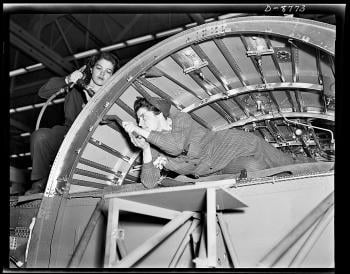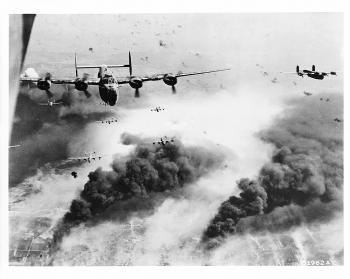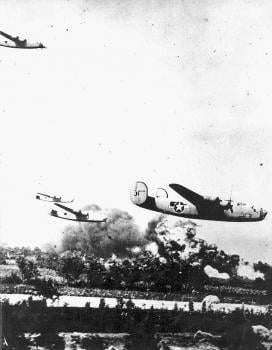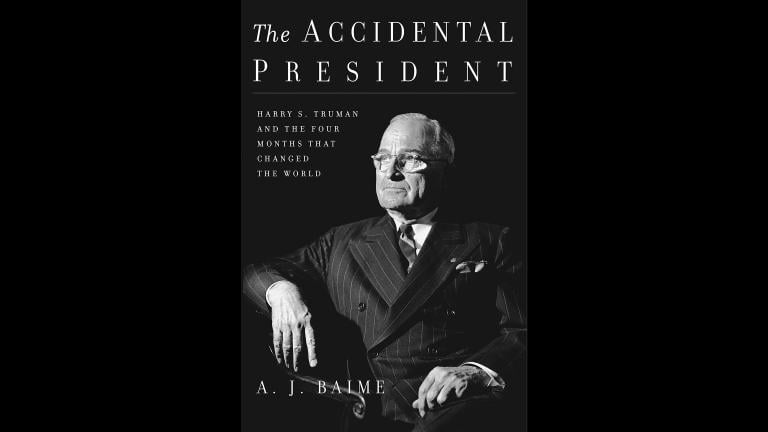 Chicago author A.J. Baime tells the story of the original Rosie the Riveter aircraft plant built by Ford to build the B-24 Liberator bomber.
Chicago author A.J. Baime tells the story of the original Rosie the Riveter aircraft plant built by Ford to build the B-24 Liberator bomber.
Edsel Ford had promised he would have the plant build a bomber an hour. Most people thought he was crazy because no one had ever mass-produced an aircraft before.
Ford succeeded and in the process built the largest factory in the world that built more than 9,000 aircraft at the rate of one every 55 minutes to help win the war against Nazi Germany.
Read an excerpt from Baime's book, and watch a video of the B-24 Liberator Willow Run Assembly Plant.
THE ARSENAL OF DEMOCRACY
FDR, Detroit, and an Epic Quest to Arm an America at War
By A. J. BaimePrologue
On the night of December 29, 1940, a few moments before 9:00 pm, Franklin Delano Roosevelt wheeled himself in his chair through the White House warrens and into the Diplomatic Reception Room on the first floor. He wore a gray wool suit and a face that, for an eternal optimist, appeared grim. An incongruous audience stood in the room. The President’s mother was there, as were some White House guests, actors Clark Gable and Carole Lombard. Roosevelt was preparing to deliver an address that generations hence would deem one of the most important pieces of political rhetoric in modern history. It was called “The Arsenal of Democracy.”
At that very moment, in London, bombs were raining from the night sky. Adolf Hitler’s air force was subjecting London to the worst pounding since the start of the Battle of Britain—a night of terror planned specifically to steer attention away from Roosevelt’s speech, which promised to solve a great mystery: what was the President prepared to do about the Nazis and their conquering armies? With most of Europe already subjugated, would Washington remain neutral? Or was Roosevelt prepared to support the effort to defeat Hitler with American-made tanks, guns, ships, and bomber aircraft?
All week long the White House had stirred with activity in anticipation of the President’s “fireside chat.” On the Sunday of the address, Roosevelt worked over every word in his office, complaining to his secretary, Grace Tully, who went heavy on the punctuation when she typed.
“Grace!” he yelled. “How many times do I have to tell you to stop wasting the taxpayers’ commas?”
When he was satisfied, he sent the speech to the State Department for comment. He had his throat sprayed to ease his sinuses. White House workers removed the gold-trimmed presidential china from the Diplomatic Reception Room, and as Roosevelt sipped cocktails and ate dinner they tested the broadcasting equipment and the wires snaking across the floor onto a desk on which a cluster of microphones stood—the ears of the world.
At the stroke of nine, the largest radio audience ever gathered tuned in. Over five hundred stations were broadcasting the speech in the United States. This was the “Golden Age of Radio,” with popular shows like Jack Benny and Amos ’n’ Andy, and yet no broadcast had ever lured more attention than the President’s speech. The only one that had come close was the Joe Louis–Max Schmeling fight at Yankee Stadium two years earlier.
Amid the rubble of Britain’s cities, at 3:00 am London time, thousands, including Prime Minister Winston Churchill, crowded around their radios. Roosevelt’s address would be broadcast in South America, China, the Soviet Union, and in six languages in Europe.
Roosevelt began. “My friends, this is not a fireside chat on war. It is a talk on national security; because the nub of the whole purpose of your President is to keep you now, and your children later, and your grandchildren much later, out of a last-ditch war for the preservation of American independence and all of the things that American independence means to you and to me and to ours,” the President said. And then, gravely: “Never before since Jamestown and Plymouth Rock has our American civilization been in such danger as now.”
The events leading up to that night had placed the President in an impossible situation.
Read the rest of the Prologue.
Excerpted from THE ARSENAL OF DEMOCRACY: FDR, Detroit, and an Epic Quest to Arm an America at War by A.J. Baime. Copyright © 2014 by A.J. Baime. Used by permission of Houghton Mifflin Harcourt Publishing Company. All rights reserved.
Watch a video of the B-24 Liberator Willow Run Assembly Plant.





